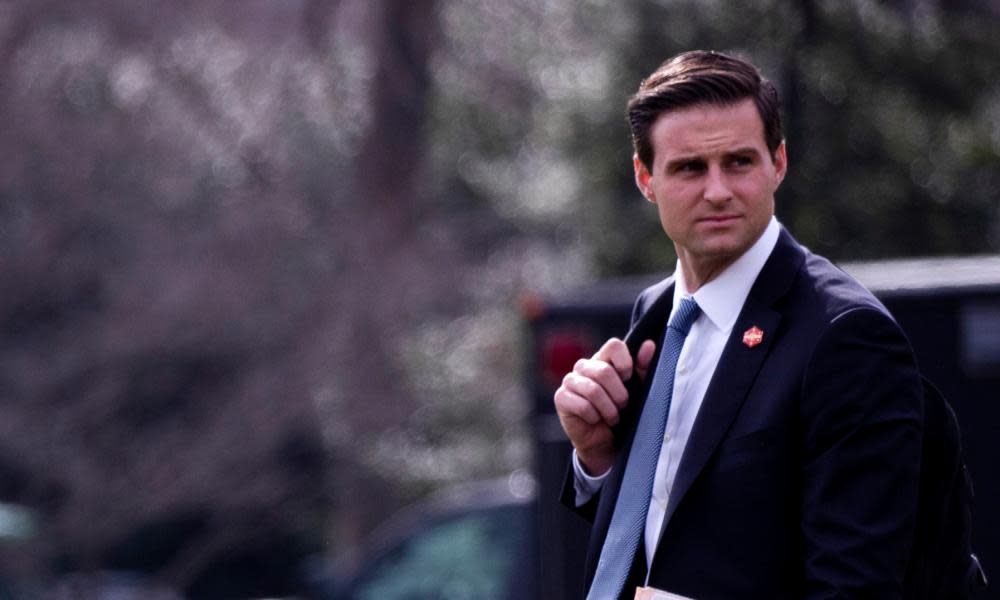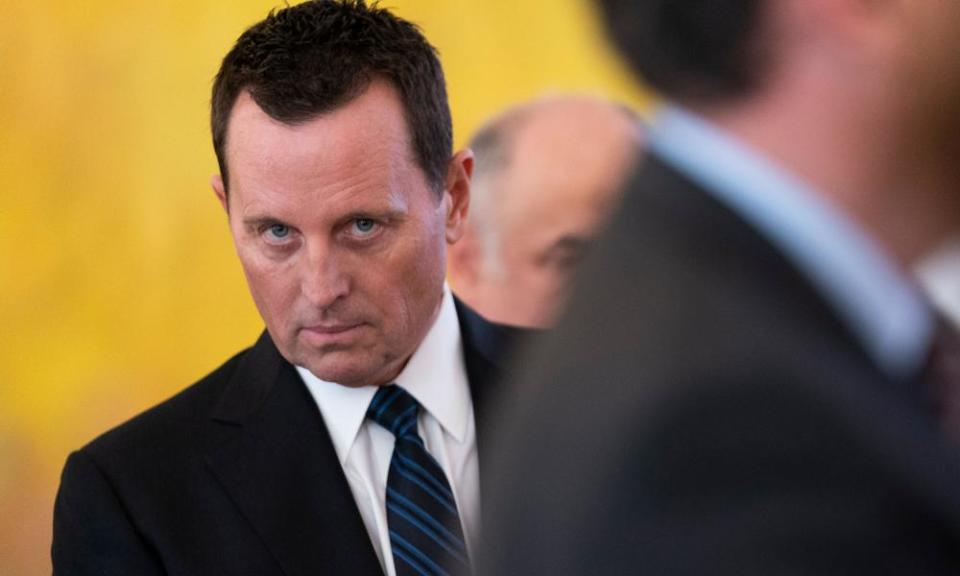Baby-faced assassin: the 29-year old at the heart of Trump's 'deep state' purge

Johnny McEntee may never surpass the fame he garnered in 2011 as a college football quarterback starring in a viral trick shot video of him throwing footballs great distances into trash cans that racked up more than 7m views.
Now, as the recently named White House director for presidential personnel, McEntee, 29, has been put in charge by Donald Trump of canning federal employees – not footballs – suspected of harboring secret anti-Trump sentiments.
McEntee summoned cabinet liaisons to the White House last week to tell them to root out Trump critics in their ranks, according to reporting by Axios. McEntee has also put a freeze on political appointments and told colleagues that the White House would be selecting cabinet deputies from now on, according to the New York Times.
The sudden conferral on the young McEntee, a former close personal aide to the president and reported favorite of the first lady, of such broad power over thousands of civil service careers is highly unusual in the history of US government, according to public administration experts.
But as Trump winds up his re-election machinery, McEntee’s elevation is only one among dozens of such moves taking place across the executive branch to install Trump loyalists, purge Trump critics and protect the president’s political wellbeing, whatever the cost.
The gist of Trump’s project, critics say, is to hone the federal government to the one purpose he believes it ought to serve: helping him. It is also a process supercharged by Trump’s acquittal at the end of his impeachment trial.
“The failure to remove the president on impeachment, and the Senate’s malleability and acquiescence to the president’s whims, clearly have emboldened him and inclined him to remove any hint of dissent, clearly in the White House and more widely in the executive branch,” said Jonathan Stevenson, a senior fellow at the International Institute for Strategic Studies and former National Security Council official under Barack Obama.
The outflow of civil servants has coincided with an inflow of trusted former Trump deputies, some of whom had previously left the White House in the turbulence of Trump’s first three years.
McEntee was forced out in 2018 by the chief of staff, John Kelly, over a problem with McEntee’s security clearances reportedly relating to online gambling. Now McEntee is back and Kelly is long gone.
The former communications director Hope Hicks, 31, who left the White House in 2018 saying she had tired of Washington, is now returning as an aide to Trump’s son-in-law Jared Kushner, 39. Immigration zealot Stephen Miller, 34, is reprising his starring campaign-season role as the choreographer of Trump’s every move on the issue.
In an occasion for widespread alarm among former intelligence officials, Trump last week installed an avid loyalist, Richard Grenell, as acting director of national intelligence, despite Grenell having no experience as an intelligence officer or in managing a large bureaucracy.
Grenell, 53, was moved into the job after Trump grew enraged that Congress had been briefed by intelligence officials that Russia was interfering in the 2020 election on Trump’s behalf. Intelligence sources later said the briefing had exaggerated the bias of Moscow for Trump specifically.
Grenell is “savvy and smart with a tremendous skillset” but unqualified for the intelligence job, said Mark Groombridge, who worked with Grenell at the US Mission to the United Nations and on Log Cabin Republican issues.
Having “a Trump toady and a sycophant” as director of national intelligence raised national security concerns, said Groombridge.
“The issue is: is there anyone in the administration who will tell truth to power?” said Groombridge. “Who will have the integrity to say, ‘Mr President, you’re wrong,’ or ‘This is something you need to know?’ And that’s the primary concern I think people have with Rick, and I think it’s legitimate.”
In the role of intelligence director, which oversees 17 spy agencies, Grenell has quickly advanced the purge-and-replace project. He expunged the second-ranking official at ODNI, Andrew Hallman, a career intelligence officer, and hired Kashyap Patel, 37, a former White House aide who helped run a series of attacks on the intelligence community over its investigation of the 2016 Trump campaign.
Patel is tasked with “cleaning house” of Trump critics “from top to bottom”, CBS News reported. Grenell did not reply to a request for comment.

Trump’s conspiratorial fixation on the notion that he is under siege from a faceless “deep state” and his insistence on personal loyalty to him across government both appear to have grown stronger since the first days of his presidency, when he told the then FBI director James Comey over dinner, “I need loyalty. I expect loyalty.”
External hard-right groups have encouraged the evolution, dishing Trump lists of supposed enemies and alternative lists of potential loyalist replacements, many familiar from Fox News, Axios reported. In the judgment of the conservative media voices Trump listens to most, even the coronavirus is a plot against the president.
It’s unclear whether there are enough Trump loyalists to replace everyone on the lists of his enemies. Officials purged from executive branch posts since the impeachment acquittal on 5 February include the impeachment witnesses Gordon Sondland and Alexander Vindman, whose brother was also purged from his national security assignment; US attorney Jessie Liu, who opposed prosecution of former FBI official Andrew McCabe, a Trump bugbear; Pentagon official Elaine McCusker, who resisted a White House directive last year to suspend aid to Ukraine; John Rood, a Pentagon official who certified that Ukraine had met anti-corruption benchmarks required for aid to flow; deputy national security adviser Victoria Coates; and Joseph Maguire, Grenell’s predecessor.
“There might be a few people who slip through the cracks, but not many,” said Stevenson of Trump’s purge. “You can’t read everybody’s minds, and there are people I think probably at the National Security Council – I’m sure there are a number of people who question Trump’s leadership and even his suitability for the job, and yet they stay for their own reasons.
“A complete and airtight purge probably is impossible. But substantial headway can be made, and apparently is being made.”
Trump’s defenders in the media and government point out he may choose executive branch employees as he pleases, and they defend his attacks on the traditional separation between politics and career service by weaving ominous tales of plots against the president from within.
Trump’s response has been to dig deeper into his list of loyalists and send Johnny up against the Deep State. It’s a game critics warn that everyone could lose.

